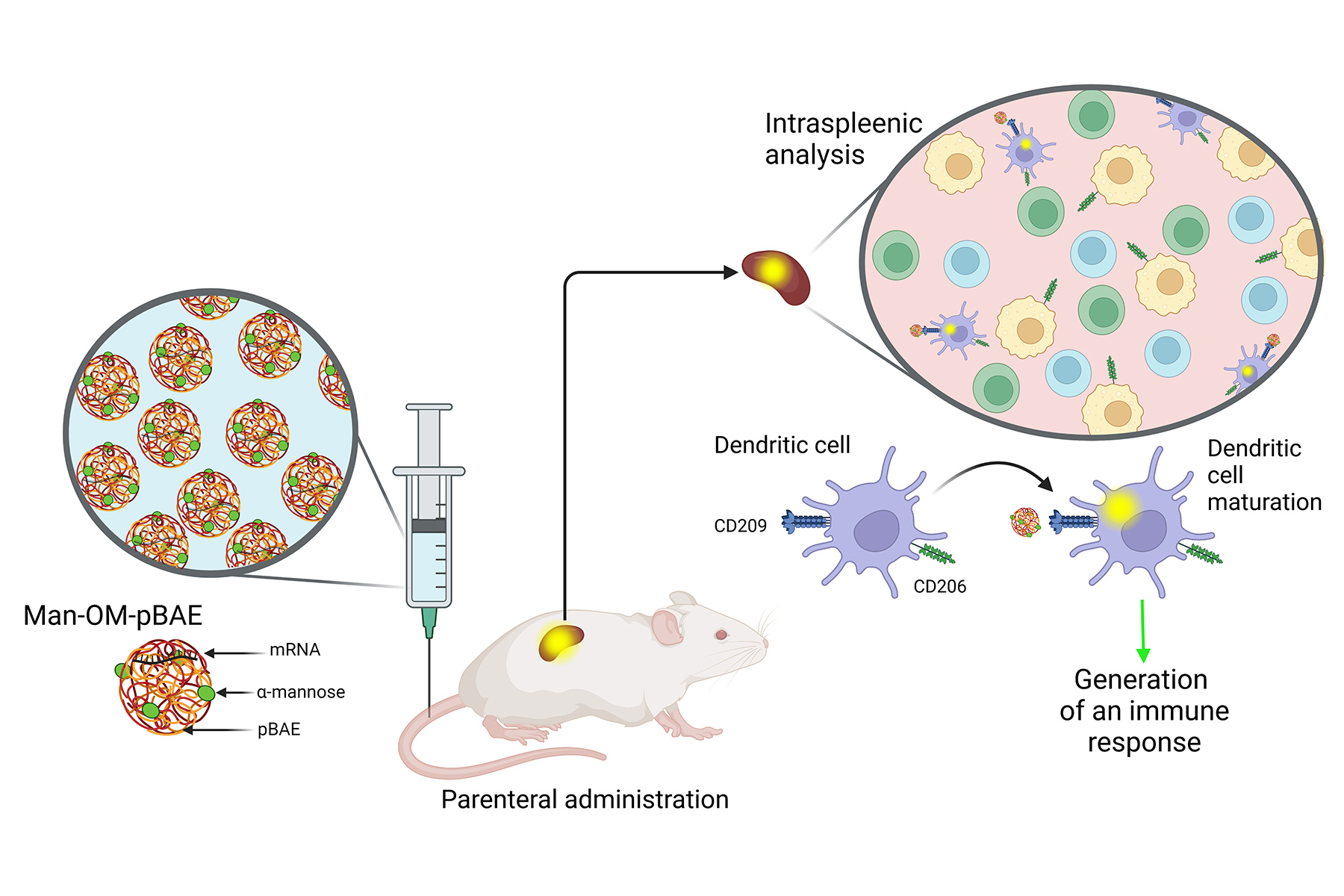The Royal Society of Chemistry (RSC) annually publishes a list of the most cited articles and reviews downloaded and shared by the scientific community which have been published in the different journals of the editorial group. Specifically, in the three categories A, B, & C, the Journal of Materials Chemistry covers high-quality studies in reference to all fields of materials chemistry.
In 2023, the article published by a team of IQS researchers under the title Novel α-mannose- functionalized poly(β-aminoester)nanoparticles as mRNA vaccines with increased antigen presenting cell selectivity in the spleen is among the 30 most popular articles in the Journal of Materials Chemistry B. The article was authored by Dr Magda Faijes and Dr Antoni Planas from the Biological and Biotechnological Chemistry Group (GQBB), Dr Cristina Fornaguera, Dr Marta Guerra, and Dr Salvador Borrós from the Materials Engineering Group (GEMAT), PhD student Nil González Ríos, a member of both the GQBB and GEMAT groups, and Dr Margalida Artigues from the Electrochemistry and Bioanalysis Group (EQBA) and head of the IQS SCIEX Demo lab.
The article is the result of joint research initiated by two IQS groups with different but complementary fields of expertise: the GQBB group, experts in carbohydrate and glycobiology research, and the GEMAT group, experts in biomaterials design, nanomedicine, and the development of mRNA vaccines. The result of their combined experience has led to the beginning of a new line of research on Glycovaccines, leading to this publication in the Journal of Materials Chemistry B, which has been worthy of appearing among the “top 30” articles in this category.
Nanoparticles decorated with sugar
One of the research lines of the GEMAT group, led by Dr Cristina Fornaguera, is aimed at designing therapeutic mRNA vaccines, an outstanding technology in medicine that has continued to advance and has proven its effectiveness. Despite these advances, mRNA carriers do not yet have specificity towards target cells, a situation that causes a reduction in their efficacy or the appearance of possible side effects. The GEMAT group’s experience is focused on designing mRNA vaccines based on nanoparticles composed of polymers called poly(β-aminoesters), owned by the group, which have been used as the basis in this study.
In addition, in the GQBB group, Dr Magda Faijes and Dr Antoni Planas are developing strategies for the chemical and enzymatic synthesis of glycans and glyconjugates, which have made it possible in this research to functionalize the polymeric nanoparticles with specific carbohydrates as ligands of the receptors of the target cells.
Antigen-presenting cells (APCs) are a cell assembly of the immune system that, through the receptors they have on the surface, can detect antigens and generate an immune response that, in the case of vaccines, can be prophylactic of infections or therapeutic in oncology. Specifically, these receptors have a high affinity for sugars and, therefore, carbohydrates can be used as vector molecules. Thus, the joint work of the two research groups has resulted in the design of a new generation of functionalized poly (β-aminoesters) nanoparticles decorated with α-mannose. This proof-of-concept has allowed the development of new mRNA carriers, which have preferentially targeted and transfected the APCs in in vitro and in vivo tests, opening the way to new vectorization strategies based on the technology present at IQS.
The structural characterization of the different polymers obtained was carried out using, among other techniques, advanced equipment such as the X500B QTOF installed at the IQS Sciex Demo Lab.
In conclusion, this collaboration between the IQS groups has demonstrated, in the preclinical setting, that the functionalization of polymeric nanoparticles with mannose allows a more selective interaction with APCs. Therefore, these polymers and nanoparticles are solid candidates for a new generation of mRNA immunotherapy vaccines, which has proven to be of great interest to the scientific community.










